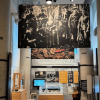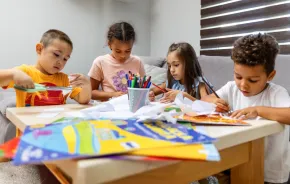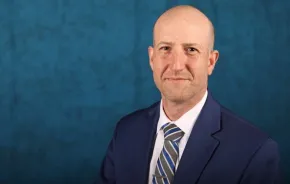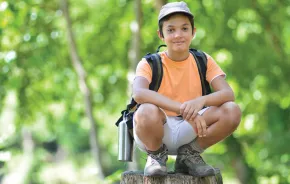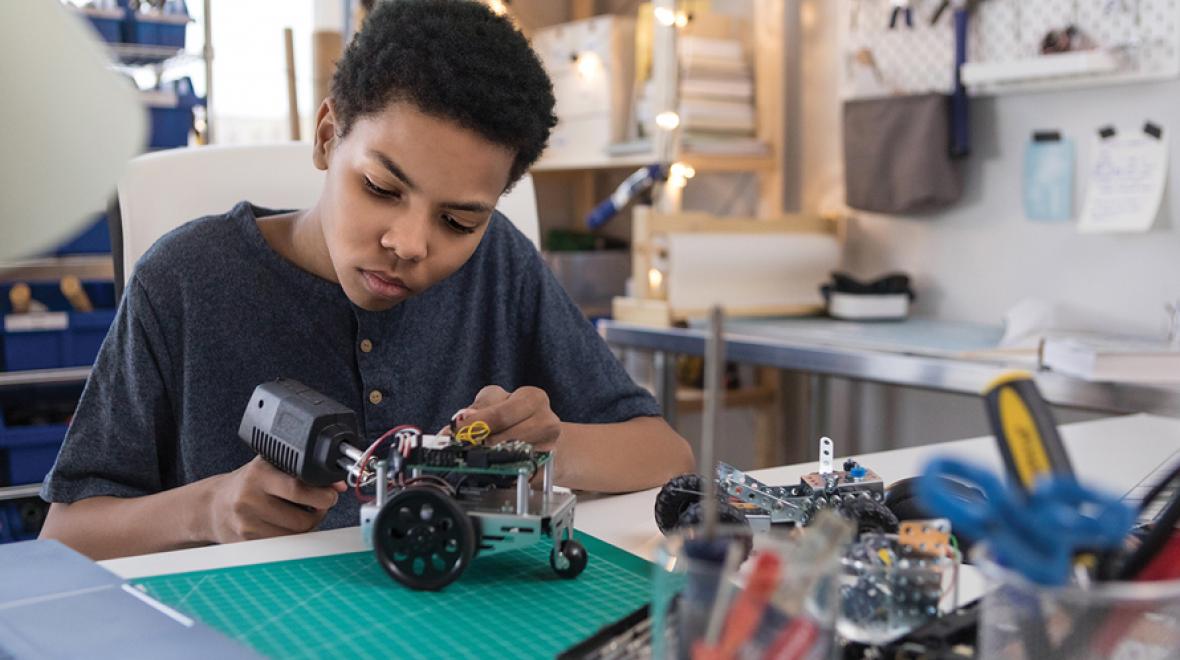
Despite popular perceptions of scientists and artists as opposite types of people, their work requires overlapping skill sets. Designing experiments takes creativity, while creating art that realizes the vision in your head requires patience, precision, and studied and applied technique. Increasingly, both scientists and artists use advanced technology to accomplish their goals. So, whether you’ve got a little Einstein or a budding Picasso under your roof, you might be looking for the same summer camp — one that breaks down the boundaries between disciplines to generate STEAM (that’s science, technology, engineering, art and math, thank you very much).
Beam Experiences
Local architects and artists have developed Beam’s guided lessons to promote creative problem-solving in a laboratory-style setting. Subject areas incorporate both art and science, with programs offered in robotics, game design, art and animation.
Ages: Grades 1–8
Cost: $175–$400
Coding with Kids
Coding with Kids is a well-known national computer science academy that uses a progressive learning model called the Coder’s Ladder. Half-day summer camps in game development, Minecraft modding (i.e., modifying), robotics and other coding applications can be paired to form full-day options. Affordable online-only camps are also offered.
Ages: 5+
Cost: $279–$559
Coyote Central
It’s not quite accurate to say that Coyote Central is an arts college for kids, but it’s close. Its 20-hour, project-based courses for tweens and young teens focus more on art than science. But many courses require students to engage with technology and machinery they won’t often see in school art class. From podcasting to music production, welding to circuit bending and bicycle building, these classes have some very practical real-world applications.
Ages: 10–15
Cost: Pay what you can; check the website for a sliding scale of suggested prices.
DigiPen Academy
At DigiPen Academy’s Project Fun summer workshops in Redmond, kids collaborate on tech-heavy, hands-on creative projects, such as video game design and programming, digital art and animation, and sound design. Each weeklong camp (two weeks for older students) ends with a showcase of student teams’ completed projects. Bonus: Lunch is included.
Grades: K–12
Cost: $700–$2,700; scholarships available
Digital Media Academy
Digital Media Academy camps work the right and left sides of the brain equally with tech-heavy creative offerings ranging from filmmaking and animation to coding and artificial intelligence. Weeklong day camps on the University of Washington campus have an overnight option for teens. With tuition for most camps in the $1,300 range, they aren’t cheap, but enrollment does come with a yearlong subscription to Adobe Creative Cloud, unlimited Google apps and some take-home hardware.
Ages: 9–18
Cost: $1,275–$2,800; scholarships available
Digivations Camp Demigod Institute
Digivations’ sleepaway camps, which take place outside Leavenworth, offer a multidisciplinary art and science curriculum designed around Percy Jackson, Harry Potter and fandom-mashup themes. Students engage in outdoor quests that may involve both robotics and role-playing. They also learn the science behind their favorite magical stories and may even write some creative fiction of their own.
Ages: 8–17
Cost: $800–$1,500; sliding-scale tuition and financial aid are available.
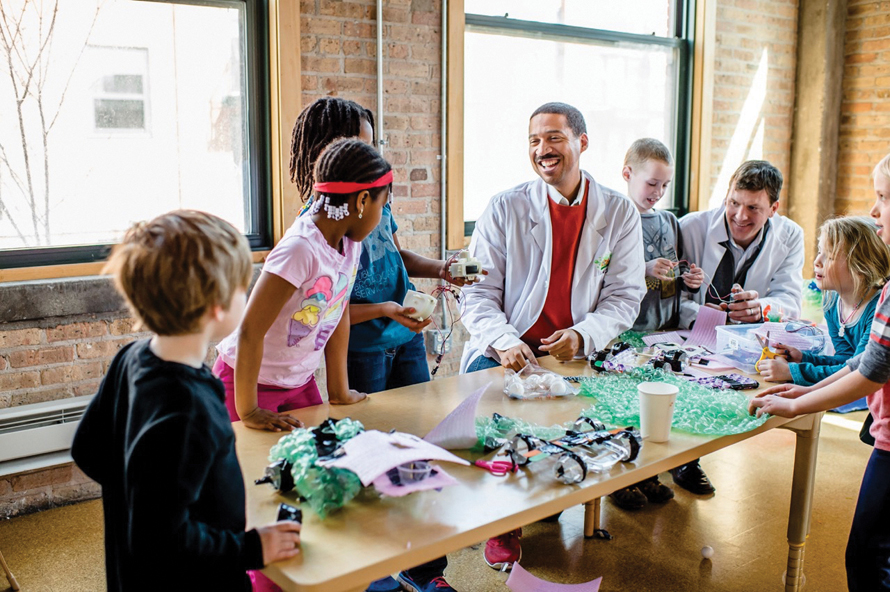
Kids Science Labs
Kids Science Labs summer camps are all about connecting kids’ natural curiosity to the problem-solving, critical-thinking and creative design skills that real scientists depend on. Instead of tutoring or test prep, KSL’s Innovators camps for kindergartners–sixth graders and Next Gen Designers Labs for fifth–eighth graders engage in hands-on explorations of human biology, computers or natural science. A project-based camp focused on design principles is also offered.
Ages: 4–12
Cost: $325–$599
Pratt Fine Arts Center
While many arts-focused youth programs are all about unlocking creativity, Pratt takes that element for granted. Instead, Pratt’s programs are designed to teach the technical skills artists need to realize their vision. Youth programs emphasize art history, drawing and found objects. Teen programs would make William Morris proud with printmaking, glassblowing, metalworking, and wood and stone carving. (It also offers Parent & Me classes throughout the year for folks who want to create something with their teen.)
Ages: 5+
Cost: $220–$360 (these are 2019 rates; check website for 2020 class fees); scholarships available
Seattle Girls’ School’s STEAM Camp
At Seattle Girls’ School’s STEAM camp, SGS teachers lead female-identifying students in a weeklong exploration of science explored through games and craft projects. Details of this year’s curriculum are still pending, but past projects have included Barbie drag races, photography, food chemistry and electronic bugs.
Grades: 3–5
Cost: $375; financial aid is available.
Spring Street International School’s Young Authors Summer Program
Essentially a two-week writing residency for high school students, the Spring Street International School’s Young Authors Summer Program doesn’t directly address science and engineering. But with its location in Friday Harbor and afternoons free for exploring San Juan Island, there are plenty of opportunities for young writers to draw inspiration from the natural world. This camp could help your young naturalist join the ranks of great nature writers, such as Rachel Carson, Wendell Berry and Camille T. Dungy.
Grades: 9–12
Cost: $2,200 ($1,600 for San Juan County residents)
The Northwest School International Summer Camp
Best known as the private school whose arts program nurtured famous musicians Stone Gossard and Jason Finn, The Northwest School also has a robust summer camp program. STEM camps include a creative math studio, computer animation, and a focus on urban nature and robotics. Arts camps include music, from songwriting to digital composition; performing arts, from African drumming to improv; and visual arts, from graphic design to filmmaking.
Grades: 6–12
Cost: Half-day $600, full-day $895, sleepaway $2,450
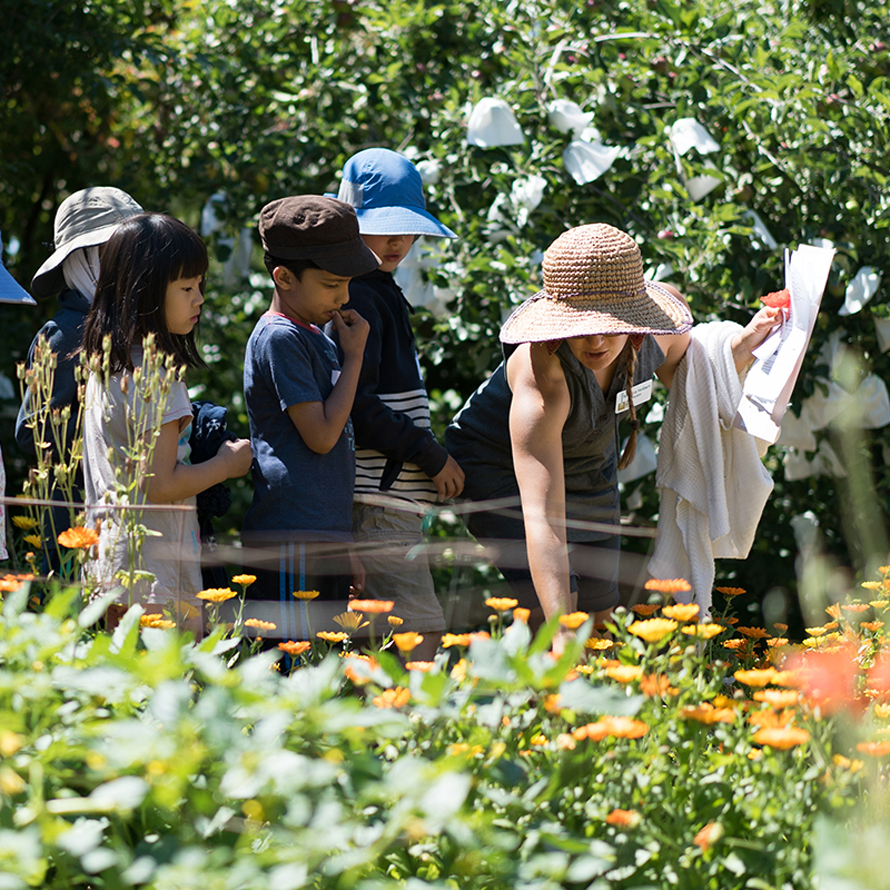
Tilth Alliance Summer Garden and Farm Camps
Not every scientist wants to shut herself up in a lab or hunch in front of a computer all summer. Tilth Alliance offers a variety of applied-science summer camps, where environmental science and botany meet art, yoga, cooking and even business. Camps are located in both North Seattle and South Seattle. Preschool camps are one day only, with costs of less than $50.
Ages: 1 (accompanied by an adult)–15
Cost: $350–$450; scholarships and sliding-scale tuition are available.

Seattle Architecture Foundation
Few fields draw from art and science as equally as architecture. The Seattle Architecture Foundation is offering a handful of summer camps this year in partnership with The Northwest School. Designing Seattle is a camp that will teach students how the design and policy decisions made years ago created the cityscape we see today, and Introduction to Architectural Modeling will teach students how to communicate design ideas with cardboard and balsa wood. The foundation will offer a similar model-making camp in partnership with Coyote Central. More camps may be added as summer approaches.
For ages and costs, see partnering organization websites.





